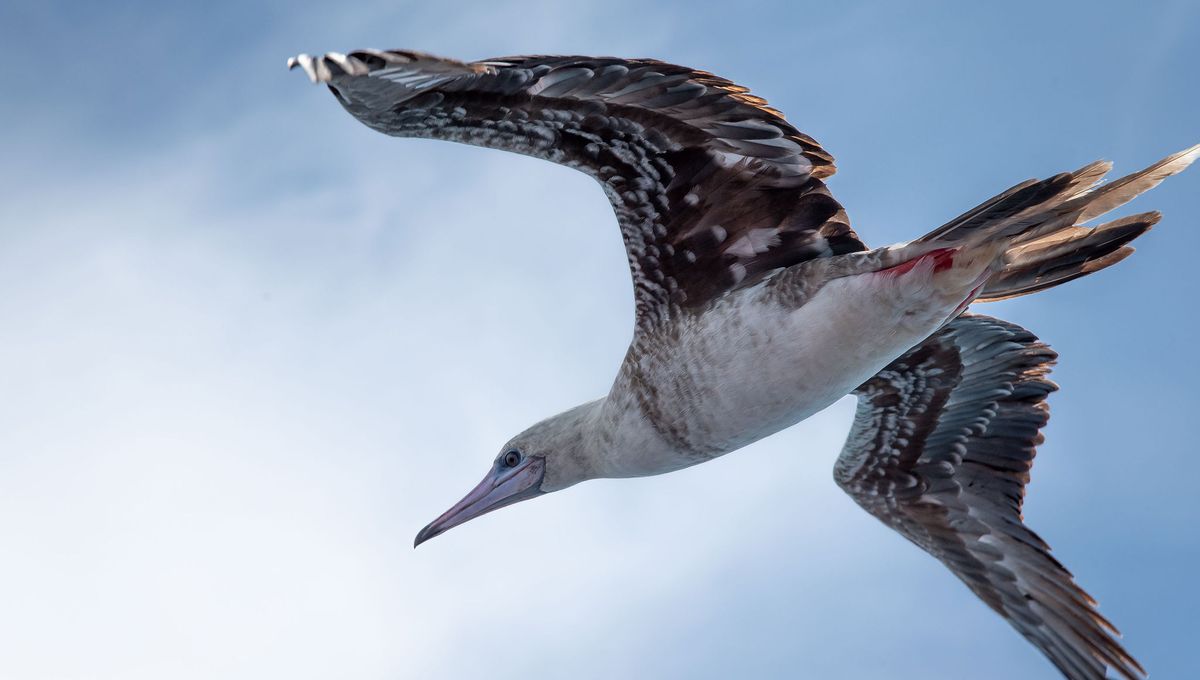
Soaring over the Indian Ocean might sound idyllic, but when you’ve got to catch your supper it becomes a lot trickier. New bird-mounted cameras have offered researchers an insight into how red-footed boobies catch flying fish, and revealed that both birds and fish are on the wing.
Red-footed boobies (Sula sula rubripes) in the Chagos Archipelago Marine Protected Area in the Indian Ocean were fitted with tiny cameras to record what the birds were up to and their feeding behaviors. Birds were also fitted with GPS accelerometers so the team could track which way they were going.
During 2019 and 2022, the team recorded 45 foraging trips from 18 individual red-footed boobies. In 2024, the team retrieved footage from two other birds amounting to 145 mins of footage with good visibility, with 15 clear predation attempts. Of these 15, 14 were boobies catching fish while flying and one was a dive below the surface of the sea.
“The cameras recorded footage of the birds catching flying fish just above the surface of the water, while on the wing,” said Dr Ruth Dunn, a Visiting Researcher at Lancaster University and lead author of the study in a statement. “We suspected this happened, but this is the first time that we’ve had bird-borne footage like this showing them foraging and catching fish mid-air. It could suggest they are catching a significant portion of their diet in this way.”
The team were also able to match the birds’ activities with the wind speed and revealed that in windy conditions, the birds are more likely to continue trying to feed than they are to rest. There is some suggestion that flying fish would be able to stay in the air longer during windier periods, providing a better opportunity for the boobies to hunt. Interestingly, this contrasts with some other ocean-foraging species like albatrosses.
“We found that the birds foraged in windy conditions and we think that this might be because flying fish are able to glide in the air for longer in these conditions, making them more accessible to the boobies,” said Dr Dunn.
The accelerometers also showed that the red-footed boobies had preferences when going out to forage and returning when it came to the wind conditions: “birds flapped more in headwinds than crosswinds, and slightly more in crosswinds than tailwinds, especially in higher wind speeds,” explain the authors.
On the way back to the colony the birds took a more direct route favoring crosswinds; however, when going out to forage the birds were taking their time, perhaps due to the fact that the flying fish did not stay in one set area and preferred cross- and tailwinds. By choosing favorable winds the birds can reach higher speeds with less flapping, and therefore less energy expenditure.
The researchers believe understanding how the birds are using wind speeds will be important in terms of changing environmental patterns due to climate change.
“This is the first step in helping us to understand more about how wind influences the behaviour and distribution of tropical seabirds,” said co-author Professor Stephen Votier, from The Lyell Centre, Heriot-Watt University’s global institute for Earth and marine sciences. “By gaining a clearer understanding of such environmental effects will enable us to predict how they will cope in the future.”
The study is published in Proceedings of the Royal Society B: Biological Sciences.
Source Link: Ride On Board A Red-Footed Booby As It Catches Flying Fish Above The Indian Ocean